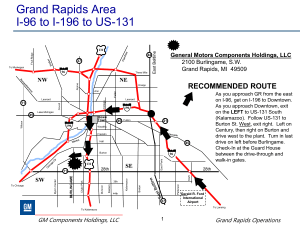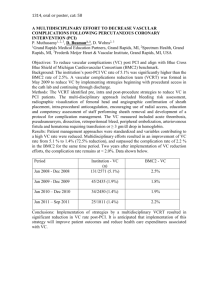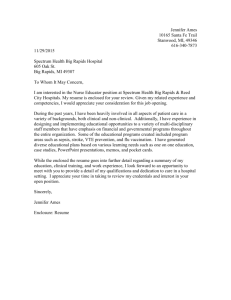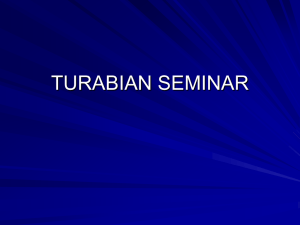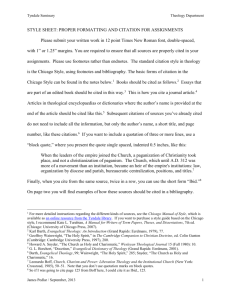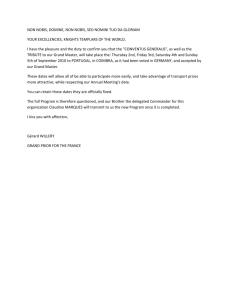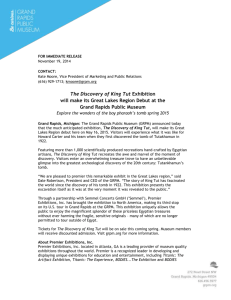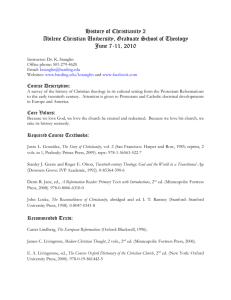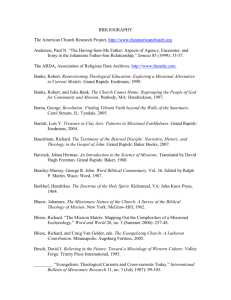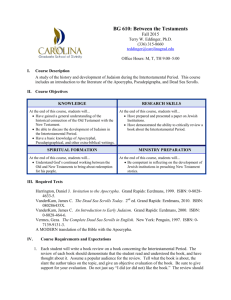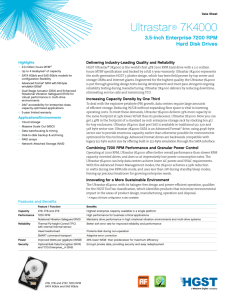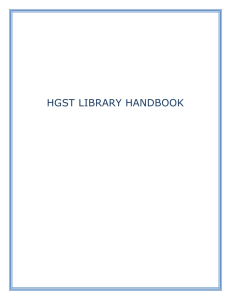PL 510
advertisement
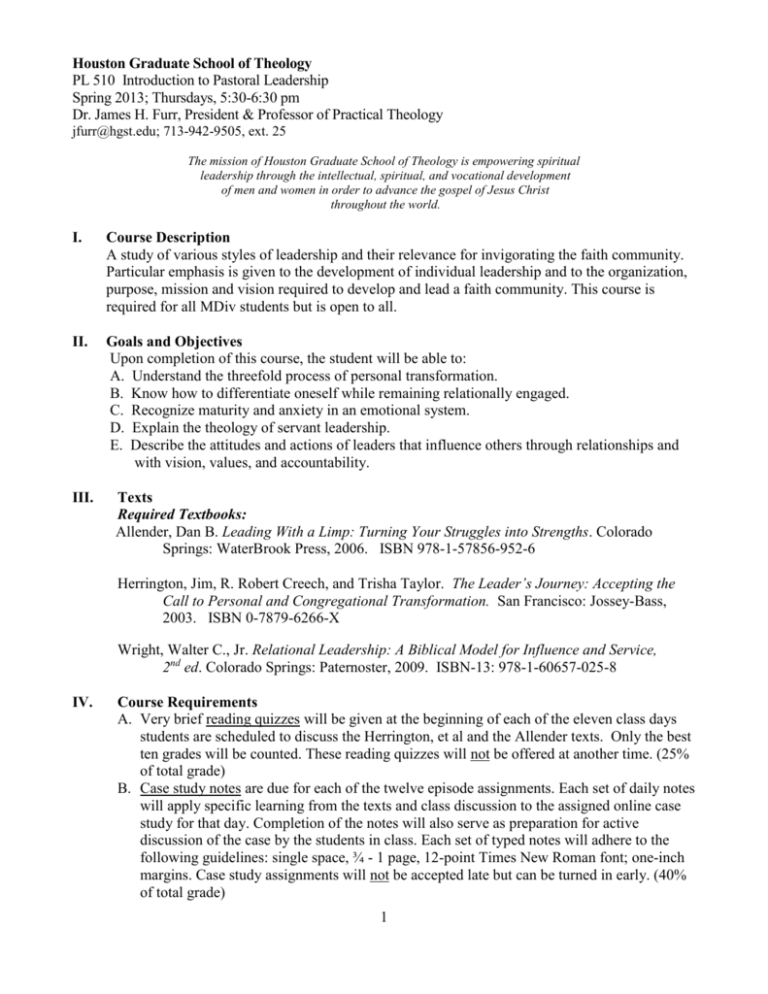
Houston Graduate School of Theology PL 510 Introduction to Pastoral Leadership Spring 2013; Thursdays, 5:30-6:30 pm Dr. James H. Furr, President & Professor of Practical Theology jfurr@hgst.edu; 713-942-9505, ext. 25 The mission of Houston Graduate School of Theology is empowering spiritual leadership through the intellectual, spiritual, and vocational development of men and women in order to advance the gospel of Jesus Christ throughout the world. I. Course Description A study of various styles of leadership and their relevance for invigorating the faith community. Particular emphasis is given to the development of individual leadership and to the organization, purpose, mission and vision required to develop and lead a faith community. This course is required for all MDiv students but is open to all. II. Goals and Objectives Upon completion of this course, the student will be able to: A. Understand the threefold process of personal transformation. B. Know how to differentiate oneself while remaining relationally engaged. C. Recognize maturity and anxiety in an emotional system. D. Explain the theology of servant leadership. E. Describe the attitudes and actions of leaders that influence others through relationships and with vision, values, and accountability. III. Texts Required Textbooks: Allender, Dan B. Leading With a Limp: Turning Your Struggles into Strengths. Colorado Springs: WaterBrook Press, 2006. ISBN 978-1-57856-952-6 Herrington, Jim, R. Robert Creech, and Trisha Taylor. The Leader’s Journey: Accepting the Call to Personal and Congregational Transformation. San Francisco: Jossey-Bass, 2003. ISBN 0-7879-6266-X Wright, Walter C., Jr. Relational Leadership: A Biblical Model for Influence and Service, 2nd ed. Colorado Springs: Paternoster, 2009. ISBN-13: 978-1-60657-025-8 IV. Course Requirements A. Very brief reading quizzes will be given at the beginning of each of the eleven class days students are scheduled to discuss the Herrington, et al and the Allender texts. Only the best ten grades will be counted. These reading quizzes will not be offered at another time. (25% of total grade) B. Case study notes are due for each of the twelve episode assignments. Each set of daily notes will apply specific learning from the texts and class discussion to the assigned online case study for that day. Completion of the notes will also serve as preparation for active discussion of the case by the students in class. Each set of typed notes will adhere to the following guidelines: single space, ¾ - 1 page, 12-point Times New Roman font; one-inch margins. Case study assignments will not be accepted late but can be turned in early. (40% of total grade) 1 2 C. Students will develop an Application List using Walter Wright’s Leadership model described in Relational Leadership. The list will identify ten concepts, tools, or practices that the student believes will be useful additions to his or her own understanding and practice of Christian leadership. The book will serve as a resource to the student for future reference and development. The list assignment will conform to the following specifications: one-inch margins (top, bottom, and sides), 12-point New Times Roman font, double space, one page in length. (10% of total grade) D. A Final Exam will be offered in the form of a reflective essay at the end of the term and cover all assigned reading material and class discussion. The objective of the essay is to summarize and assess an understanding of the student’s own leadership in response to the course objectives. The paper will conform to the following specifications: one-inch margins (top, bottom, and sides), 12-point New Times Roman font, double spaced, six pages in length. (25% of total grade) V. Grading Scale The following grading system will be used for this class, remembering that and “A” is a superior grade, a “B” an above average grade, and a “C” is quality, satisfactory work. A = 90-100 VI. B = 80-89 C = 70-79 D = 60-69 F= ‹ 60 Policies A. Regular attendance and submission of assignments on due dates in syllabus is expected. Each student must talk to the instructor about circumstances affecting his or her ability to attend class and complete assignments. Attendance is required at scheduled classes and at the scheduled start time. B. Work is expected on the due date. Note that most assignments are not accepted after the due date although they can be submitted earlier. C. Electronic Equipment Usage in Class It is expected that students will use technology (cell phones, laptop computers, iPads, etc.) during classes only for the purposes of class work. Therefore, students should turn off cell phones and refrain from texting and using laptop computers during classes except for the purposes of taking notes or doing research specifically authorized by the course instructor. Students who have emergency needs not covered by this policy must ask for an exception from the course instructor. D. Incompletes In cases of extenuating circumstances, and at the discretion of the instructor, a student may request and apply for an extension on the reflection paper, which are not completed by the end of the semester or term, subject to a 5-point grade reduction on the final grade of each assignment. If an extension is granted, the instructor will record a grade of “I” (Incomplete) and set an extension of time, not to exceed thirty calendar days from the end of the class, within which to complete the work. Additional extensions may be granted only by the Academic Dean or Associate Dean and only after a student has petitioned the Dean in writing. If the course work is not completed within the extended time allotment, the grade of “I” will be converted to the grade earned by the student up to that point.The student is responsible to ensure that all necessary paperwork is submitted to the registrar’s office by the deadline published in the school calendar. 3 E. Turnitin.com Policy 1. All written assignments are subject to required submission to www.turnitin.com to check for originality and style. The assignments that are required for submission will be described in the syllabus. 2. Students will create an account at www.turnitin.com. After doing so, the student will join the course page with the code and password supplied by the instructor. A list of assignments and due dates will be available on the course page. 3. Students will submit assignments by the due date and time and may be required to submit the assignments in a hard copy format. F. Plagiarism Plagiarism is presenting the work of another person as one’s own without giving proper credit for the use of the information. Students must not quote books, articles, essays, or Internet sites without giving proper credit to the author(s). Students should guard against plagiarism by crediting the original author through use of proper citations. Internet plagiarism is a particularly easy and tempting form of intellectual theft. Cutting and pasting sentences and paragraphs from the Internet without citations is plagiarism. Failure to cite Internet sources is plagiarism. Any student who is found guilty of plagiarism is subject to a range of consequences as outlined below. 1. If a faculty member suspects plagiarism, the instructor will investigate. If suspicions are confirmed, the faculty member will present the evidence to the appropriate Associate Dean as a record of the offense. If the Associate Dean concurs with the allegations, the following procedures should be implemented as applicable: The faculty member may discuss the offense with the student following consultation with the Associate Dean, but the student will meet with the Associate Dean. For a first offense, the faculty member, in consultation with the Associate Dean, may give opportunity for a rewrite of the assignment or may assign a grade of zero for the plagiarized assignment. For a particularly egregious case of plagiarism on a major assignment, the consequences could result in automatic failure of the course. 2. The student may appeal the above-mentioned decisions of the faculty member in writing to the Academic Dean. 3. The second confirmed offense will result in expulsion from school. The student will be notified by a letter from the Academic Dean. His or her only opportunity for appeal will be to the President in writing. The President’s decision will be final. F. Library Usage A student’s ability to get the most out of library resources will enhance the possibility of earning a high grade in this class. Therefore, students should consider using, in addition to the HGST library, one or more of the following libraries. 1. Houston Public Library— Any resident of Texas can obtain a free Houston Public Library card. Library cardholders have access to all of the books in the library system as well as the use of free interlibrary loans, meaning that HPL cardholders can borrow almost any book available. Cardholders can use the library’s website, www.houstonlibrary.org, to search the catalog and manage interlibrary loans. The website also contains links to WorldCat and other online databases that will enhance your research. The HPL location that is closest to HGST, the Collier Regional Branch (832-393-1740), is located at 6200 Pinemont, which is less than three miles from 4 2. 3. 4. 5. 6. VII. campus. A better option would be the newly expanded and renovated Central Library (832-393-1313), which is located downtown at 500 McKinney. In addition, HPL has many other locations. The HGST library can give you an application for an HPL library card, or you can print the application form from their website. Fondren Library at Rice University— The Fondren Library (713-348-5113) is located at 6100 Main. Please visit www.rice.edu/fondren for more information. The procedure for borrowing books at the Fondren Library is, first, go to the online catalog [www.rice.edu/fondren] to search for available books; second, go to the HGST library and fill out a form, signed by HGST library personnel, to take with you to the Fondren Library for each book; third, retrieve the book(s) yourself; fourth, take the book(s) and the signed form to the circulation desk to complete checkout (return the yellow copy to the HGST library; when the book(s) are returned to the Fondren Library, they will indicate so on the pink and gold copies; return the pink copy to the HGST Library and keep the gold copy for your records). Lanier Theological Library is a new resource for scholarly theological research in the Houston area. The library is open to the public, Monday, Wednesday-Friday, 9:00 AM 5:00 PM, and Tuesday, 9:00 AM - 9:00 PM. The library is a research library with no circulation privileges. Nonetheless, students should consider Lanier Library to be a valuable research option. The catalog of Lanier Library is available online: http://alexandria.lanierlibrary.net/#_. Cardinal Beran Library at St Mary’s Seminary—the home of an extensive theological library, St Mary’s Seminary (713-686-4345) is located at 9845 Memorial Drive, only 4.6 miles from HGST. For more information, please visit http://beran.stthom.edu. The Doherty Library on the main campus of University of St Thomas is also an option. Library of the Presbytery of the New Covenant – as an HGST student you have borrowing privileges at this library located at 1110 Lovett Blvd, Houston. To search their online catalog, go to http://www.pbyofnewcovenant.org/cgi-bin/rqm/rqm.cgi. Other options include Harris County Public Library (www.hcpl.net) and the libraries at the University of Houston and Houston Baptist University. Notes for Writing Assignments A. Writing assignments should conform to Kate Turabian, A Manual for Writers of Term Papers, Theses, and Dissertations, 7th Edition. This includes matters of style and format. Counseling students should pay particular attention to the Manual guidelines on submission of academic papers. B. Writing assignments should conform to Kate Turabian, A Manual for Writers of Term Papers, Theses, and Dissertations, 7th Edition. This includes matters of style and format. Counseling students should pay particular attention to the Manual guidelines on submission of academic papers. C. The instructor requires the use of footnotes for documentation. The student should number pages. According to Turabian, page numbers should be in the upper right hand corner, except for the first page of the paper (not counting the title page). Margins should be one inch on all four sides, except where major headings require a two-inch top margin. D. The student should utilize 12-point Times New Roman font throughout. The instructor prefers that the student not use presentation or report binders or folders. He prefers submission of papers with staples. 5 VIII. Class and Reading Schedule Selected readings should be completed prior to class discussion of the assignment. Reading Assignments Case Study Episodes & Notes* Personal Transformation Herrington, et al pp. viii-25 Background A Feb. 7 Leading Living Systems Herrington, et al pp. 29-84 Background B Feb. 14 Herrington, et al pp. 87-126 1 Feb. 21 Family Patterns The Spirit and the Journey Herrington, et al pp. 129-155 2 Feb. 28 The Cost of Leadership Allender pp. 1-36 3-4 March 7 Strength through Weakness Allender pp. 37- 62 5-6 Class Date Topics Jan. 24 Course & Topic Overview Jan. 31 March 14 Spring Break—No Class March 21 Crisis and Complexity Allender pp. 63-93 7-8 March 28 Betrayal and Loneliness Allender pp. 95-123 9-10 April 4 Weariness and Calling Allender pp. 125-142 11-12 April 11 Character and Community Confession and Biblical Roles Allender pp. 143-169 13-14 Allender pp. 171-199 15-17 April 18 May 2 Walter Wright’s Leadership Model Walter Wright’s Leadership Model May 9 Final Exam April 25 18-19 Wright’s Model Application Due * Read assigned online episodes at the following: http://www.christianleaders.org/Almond_Springs/index.htm and prepare discussion notes based on questions provided by the professor. The professor of record reserves the right to adjust the classroom schedule as the course develops. 6 IX. Bibliography Ammerman, Nancy T. et al. Studying Congregations. Nashville: Abingdon, 1998. Argyris, Chris. Teaching Smart People How to Learn. Boston: Harvard Business School Press, 2008. Barrett, Lois Y., et. al. Treasure in Clay Jars: Patterns in Missional Faithfulness. Grand Rapids: Eerdmans, 2004. Bass, Dorothy D., ed. Practicing Our Faith: A Way of Life for a Searching People. San Francisco: Jossey-Bass, 1997. Bonem, Mike. In Pursuit of Great and Godly Leadership. San Francisco: Jossey-Bass, 2012. Bonem, Mike and Roger Patterson. Leading from the Second Church. San Francisco: Jossey-Bass, 2005. Bosch, David J. Transforming Mission: Paradigm Shifts in Theology of Mission. Maryknoll, NY: Orbis Books, 1991. Branson, Mark Lau. Memories, Hopes, and Conversations: Appreciative Inquiry and Congregational Change. Herndon, VA: The Alban Institute, 2004. Branson, Mark Lau and Juan F. Martinez. Churches, Cultures, and Leadership: A Practical Theology of Congregations and Ethnicities. Downers Grove, IL: IVP Academic, 2011. Burns, James MacGregor. Leadership, Reprint edition. Grove Press, 2005. (Originally published by Harper and Row in 1978.) Calhoun, Adele A. Spiritual Disciplines Handbook: Practices That Transform Us. Downers Grove, IL: IVP Books, 2005. Conner, Benjamin, T. Practicing Witness: A Missional Vision of Christian Practices. Grand Rapids: Eerdmans, 2011. Cormode, Scott. Making Spiritual Sense: Christian Leaders as Spiritual Interpreters. Nashville: Abingdon, 2006. De Pree, Max. Leadership is an Art. New York: Dell, 1989. _________. Leadership Jazz. New York: Dell, 1992 Dykstra, Craig. Growing in the Life of Faith, 2nd ed. Louisville: Westminster John Knox Press, 2005. Farber-Robertson, Anita. Learning While Leading: Increasing Your Effectiveness in Ministry. The Alban Institute, 2000. 7 Friedman, Edwin, H. A Failure of Nerve: Leadership in the Age of the Quick Fix. New York: Seabury Books, 2007. Foster, Richard J. Celebration of Discipline: The Path to Spiritual Growth. San Francisco: HarperSanFrancisco, 1998. _________. Streams of Living Water: Celebrating the Great Traditions of Christian Faith. New York: HarperSanFrancisco, 1998. Frost, Michael and Alan Hirsch. The Shaping of Things to Come: Innovation and Mission for the 21st Century Church. Peabody, MA: Hendrickson, 2003. Gilbert, Roberta M. Extraordinary Leadership: Thinking Systems, Making a Difference. Falls Church, VA: Leading Systems Press, 2006. Goheen, Michael W. A Light to the Nations: The Missional Church and Biblical Story. Grand Rapids: Baker Academic, 2011. Guder, Darrell L. The Continuing Conversion of the Church. Grand Rapids: Eerdmans, 2000. Guder, Darrell L., ed. Missional Church: A Vision for the Sending of the Church in North America. Grand Rapids: Eerdmans, 1998. Hadaway, C. Kirk. Behold I Do a New Thing: Transforming Communities of Faith. Cleveland: Pilgrim Press, 2001. Heifetz, Ronald A. Leadership Without Easy Answers. Cambridge, MA: Harvard University Press, 1994. Herrington, Jim, Mike Bonem and James H. Furr. Leading Congregational Change: A Practical Guide for the Transformational Journey. San Francisco: Jossey-Bass, 2000. Hunsberger, George R. and Craig Van Gelder, eds. The Church Between Gospel and Culture. Grand Rapids: Eerdmans, 1997. Jacobsen, Eric O., ed. The Three Tasks of Leadership. Grand Rapids: Eerdmans, 2009. Katzenbach, Jon R. and Douglas K. Smith. The Wisdom of Teams. Boston: Harvard Business School Press, 1993. Lencioni, Patrick M. The Five Dysfunctions of a Team. San Francisco: Jossey-Bass, 2002. Lott, David B., ed. Conflict Management in Congregations. The Alban Institute, 2001. McNeal, Reggie. Missional Communities: The Rise of the Post-Congregational Church. San Francisco: Jossey-Bass, 2011. 8 Newbigin, Lesslie. The Gospel in a Pluralistic Society. Grand Rapids: Eerdmans, 1989. Oswald, Roy M. and Barry Johnson. Managing Polarities in Congregations: Eight Keys for Thriving Faith Communities. Herndon, VA: The Alban Institute, 2010. Peterson, Eugene H. and Marva Dawn. The Unnecessary Pastor. Grand Rapids: Eerdmans, 2000. Quinn, Robert E. Building the Bridge as You Walk on It. San Francisco: Jossey-Bass, 2004. Rendle, Gilbert R. Leading Change in the Congregation: Spiritual and Organizational Tools for Leaders. The Alban Institute, 1999. Roxburgh, Alan J. Missional: Joining God in the Neighborhood. Grand Rapids: BakerBooks, 2011. Roxburgh, Alan J. and Fred Romanuk. The Missional Leader: Equipping Your Church to Reach a Changing World. San Francisco: Jossey-Bass, 2006. Schein, Edgar. Organizational Culture and Leadership. San Francisco: Jossey-Bass, 1992. Senge, Peter M. The Fifth Discipline: The Art and Practice of the Learning Organization. New York: Doubleday, 1990. Steinke, Peter L. A Door Set Open: Grounding Change in Mission and Hope. Herndon, VA: The Alban Institute, 2010. Van Gelder, Craig. The Ministry of the Missional Church: A Community Led by the Spirit. Grand Rapids: BakerBooks, 2007. Van Gelder, Craig, ed. The Missional Church and Leadership Formation: Helping Congregations Develop Leadership Capacity. Grand Rapids: Eerdmans, 2009. Van Gelder, Craig and Dwight J. Zscheile. The Missional Church in Perspective: Mapping Trends and Shaping the Conversation. Grand Rapids: Baker Academic, 2011. Vanhoozer, Kevin, et. al., eds. Everyday Theology: How to Read Cultural Texts and Interpret Trends. Grand Rapids, Baker Academic, 2007. Volf, Miroslav and Dorothy C. Bass, eds. Practicing Theology: Beliefs and Practices in Christian Life. Grand Rapids: Eerdmans, 2001. Willimon, William H. Pastor: The Theology and Practice of Ordained Ministry. Nashville: Abingdon, 2002. Wright, Christopher J. H. The Mission of God’s People: A Biblical Theology of the Church’s Mission. Grand Rapids: Zondervan, 2010.
